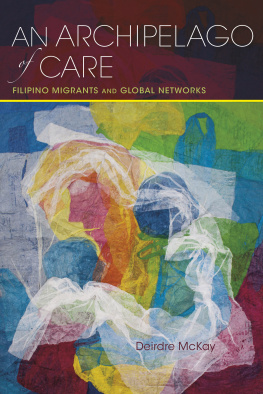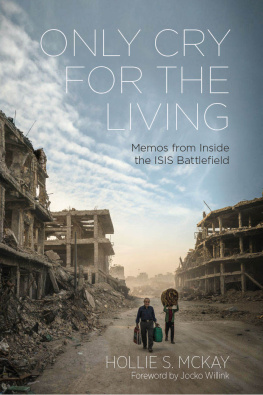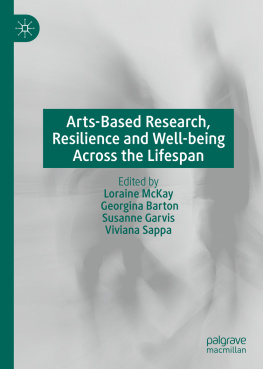AN ARCHIPELAGO OF CARE
GLOBAL RESEARCH STUDIES
The Global Research Studies series is part of the Framing the Global project, an initiative of Indiana University Press and the Indiana University Center for the Study of Global Change, funded by the Andrew W. Mellon Foundation.
Hilary E. Kahn and Deborah Piston-Hatlen, series editors
ADVISORY COMMITTEE
Alfred C. Aman Jr.
Eduardo Brondizio
Maria Bucur
Bruce L. Jaffee
Patrick OMeara
Radhika Parameswaran
Heidi Ross
Richard R. Wilk
AN ARCHIPELAGO OF CARE
Filipino Migrants and Global Networks
Deirdre McKay
This book is a publication of
Indiana University Press
Office of Scholarly Publishing
Herman B Wells Library 350
1320 East 10th Street
Bloomington, Indiana 47405 USA
iupress.indiana.edu
2016 by Deirdre McKay
All rights reserved
No part of this book may be reproduced or utilized in any form or by any means, electronic or mechanical, including photocopying and recording, or by any information storage and retrieval system, without permission in writing from the publisher. The Association of American University Presses Resolution on Permissions constitutes the only exception to this prohibition.

The paper used in this publication meets the minimum requirements of the American National Standard for Information SciencesPermanence of Paper for Printed Library Materials, ANSI Z39.48-1992.
Manufactured in the United States of America
Library of Congress Cataloging-in-Publication Data
Names: McKay, Deirdre, author.
Title: An archipelago of care : Filipino migrants and global networks / Deirdre McKay.
Description: Bloomington : Indiana University Press, [2016] | Series: Global research studies | Includes bibliographical references and index.
Identifiers: LCCN 2016041299 (print) | LCCN 2016044084 (ebook) | ISBN 9780253024671 (cloth : alk. paper) | ISBN 9780253024831 (pbk. : alk. paper) | ISBN 9780253024985 (e-book)
Subjects: LCSH: Foreign workers, FilipinoSocial networksEnglandLondon. | Kankanay (Philippine people)Social networksEnglandLondon. | Household employeesSocial networksEnglandLondon. | Service industries workersSocial networksEnglandLondon.
Classification: LCC HD8398.F55 M35 2016 (print) | LCC HD8398.F55 (ebook) | DDC 331.5/440899921dc23
LC record available at https://lccn.loc.gov/2016041299
1 2 3 4 5 22 21 20 19 18 17
Contents
Acknowledgments
MY THANKS TO my friends Biag and Labanet, who have generously shared their lives with meboth in London and in the Philippines. Keeping their real names confidential and blurring some of their identifying details are the least I can do to protect their privacy. While these same concerns preclude thanking all my other respondents by name here, they do not lessen the gratitude I feel to them for contributing to the project.
No book is an academic island; this one is especially well networked. As I developed the project, I had wonderful mentors in June Prill-Brett in Baguio City and Danny Miller in London. My research began with a visiting research associate position with Danny at University College London, part of my Senior Research Fellow role on the Footsteps project, an AHRC UK Diasporas, Migrations, and Identities theme initiative, led by Pnina Werbner (Keele University) and Mark Johnson (Goldsmiths). My work then received support from the Framing the Global initiative funded by the Mellon Foundation and Indiana University Press. As part of this amazing interdisciplinary collaboration, I benefitted from discussions with the other Fellows: Rachel Harvey, Prakash Kumar, Alex Perullo, Stephanie de Boer, Sean Metzger, Faranak Miraftab, Zsuzsa Gille, Tim Bartley, Deborah Cohen, Lessie-Jo Fraser, Katerina Teaiwa, Manuela Ciotti, and Anne Griffiths. Hilary Kahn and Deborah Piston-Hatlen gave great advice, as did project visitors Saskia Sassen and Gillian Hart. Finally, when it came to the nitty-gritty of polishing draft chapters, I owe thanks to my readers: Rachel Harvey, Marie-Andre Jacob, Ben Smith, Lisa Lau, and Labanet.
Funds from the Framing the Global initiative enabled me to complete the bulk of the UK fieldwork. A small grant from the British Academysupported Association of Southeast Asian Studies UK covered travel to the Philippines, while Keele University contributed travel costs for my final round of interviews in London.
The image on the cover is Sa lilim ng plastic (the shadow of plastic) by Baguio artist Jojet Lamberto Mondares. Jets plastic bag collage shows a mother cradling her children. He created this piece in response to the landslide in Baguio City in 2011 plastic bags buried in a former landfill site made the slopes of the suburb built above it unstable. This same hillside suburb is where my respondents in , Back Home, have invested their London earnings.
Note on Transliteration
TO TRANSLITERATE MY respondents comments from Filipino, Ilokano, and Kankanaey, I follow accepted linguistic conventions. Kankanaey, Ilokano, and Filipino terms appear in italics and are defined at first use. All translations are my own, with assistance from my respondents, and appear in square brackets within quotations. The exception to these conventions is the text speak slangdeveloped for SMS messaging and combining local languages with Englishthat my respondents also used to post comments on social media. I reproduce these comments verbatim, including keyboard errors, SMS shortcuts, and spelling mistakes, and with translation for non-English terms. Similarly, where respondents spoke or wrote in Filipino English and I have transcribed or quoted their comments, their original grammar and syntax appears intact.
AN ARCHIPELAGO OF CARE
Introduction
An Archipelago of Care
TO CARE, YOU have to CARE. Its that simple. Father Alabag brought his hand, palm flat, down on the table for emphasis. His gesture caused the table to shudder and coffee cups to clink. His wide-eyed expression held my attention as spilled coffee sloshed into the saucers. Recoiling from Father Alabags intensity, Ros-al, Calangbay, and I drew back with gasps, our wooden chairs squeaking. Father Alabag had preached the sermon at his East London church that morning. In the evening, he would work as a caregiver for an elderly man with dementia. He spoke with eloquence about his inability to find steady work in London. He had arrived five years earlier on a tourist visa. He had overstayed, hoping to eventually find a permanent job and somehow convert his visa status. Now he felt stuck in London, unable to find a stable livelihood yet reluctant to go homeone of the United Kingdoms six hundred thousand or more undocumented migrants, working as a cash-in-hand caregiver.
Father Alabag was not only a caregiver, a priest, and an irregular migrant; he was also a community activist. I met him after church, introduced by his cousin Ros-al and her friend, Calangbay. I had invited all three of them to a caf nearby to discuss their thoughts on Filipinos and care work in the United Kingdom. I wanted to know how Filipino migrants were able to sustain their reputations as caregivers in the London labor market. Id hoped their answer would tell me what care was. Was it some special aptitude or technique? No! There was no special national Filipino aptitude for careFather Alabag was adamant. So Id asked, What, then, gives Filipino migrants such a well-regarded aptitude for caring work? How do Filipino migrants support themselves in doing care? And Father Alabag expanded on his initial idea:







 The paper used in this publication meets the minimum requirements of the American National Standard for Information SciencesPermanence of Paper for Printed Library Materials, ANSI Z39.48-1992.
The paper used in this publication meets the minimum requirements of the American National Standard for Information SciencesPermanence of Paper for Printed Library Materials, ANSI Z39.48-1992.